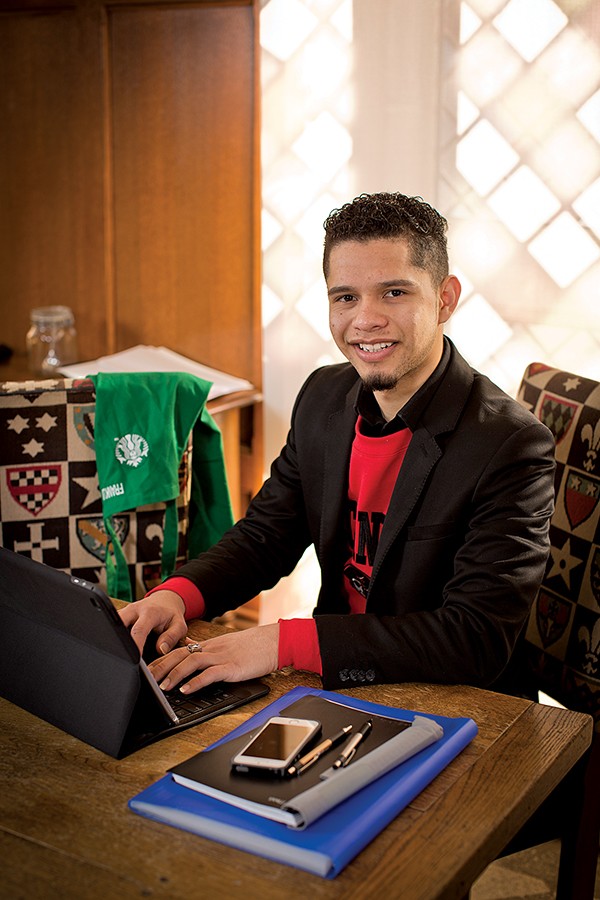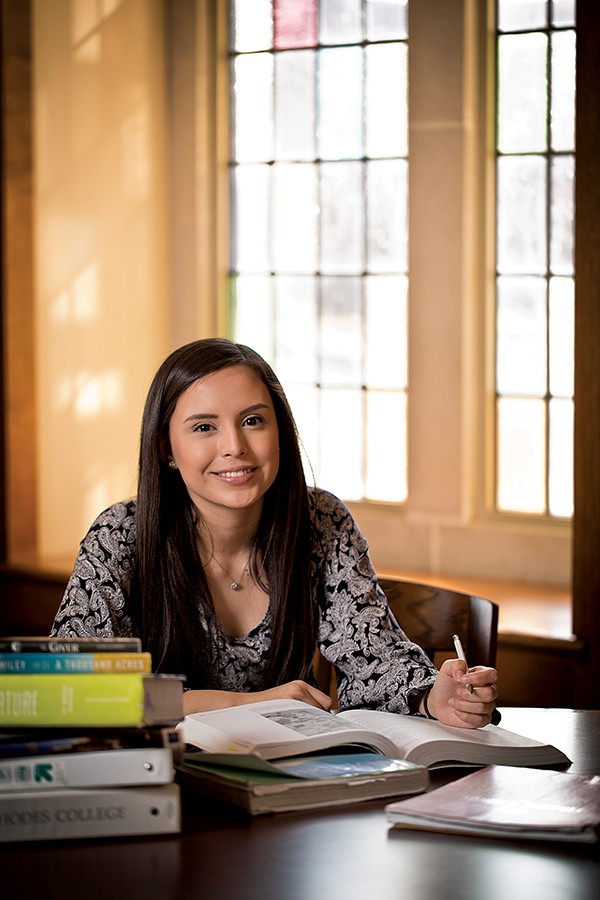For Frankie Paz, a 19-year-old student at Christian Brothers University, it was a day like any other: up at 3 a.m. for an eight-hour shift at Starbucks on Union, then a quick change of clothes before heading to campus for a full load of classes. He arrived home at 8 p.m. for dinner with his mother and siblings, before a few hours of sleep and a new day, with the same mix of work and school.
This typical day, however, was interrupted by an invitation to accompany CBU President John Smarrelli Jr. to the White House, where President Barack Obama would recognize the university’s investment in Latino youth. A couple of days later, Frankie was photographed in the Blue Room flanked by the two presidents — Smarrelli and Obama.
From Memphis to the White House and back. It’s an unlikely journey for the Honduras native who entered the United States illegally as a 3-year-old, especially given the current national political climate and Tennessee’s reluctance to facilitate the success of kids like Frankie. But Frankie’s story and the story of Jocelyn Vazquez, another thriving young Latina in Memphis, personify the struggles, resiliency, strength, and hopes of the immigrant experience here in Memphis and in pockets across the United States.
“Despite the efforts of some to vilify immigrants and refugees, a key component of our national identity is a United States that symbolizes safety and opportunity for migrants,” said David Lubell, a former Memphian and the executive director and founder of Atlanta-based Welcoming America, an organization that seeks to develop inclusive communities that embrace immigrants. “The successes of hardworking young immigrants are the foundation upon which we continue to fight to preserve our reputation as a country that welcomes strivers from around the world.”
On June 15, 2012, recognizing the need for such a foundation after the hope of comprehensive immigration reform faded, President Obama signed an executive order providing for Deferred Action for Childhood Arrivals (DACA). This executive action, signed after months of unrelenting pressure from young Latino and Latina activists, offers relief for people who as children came to or remained in the United States without proper documentation. After filing an application and passing background checks, these DACA youth are offered a renewable two-year deferred status to work, study, and live here without daily fear of deportation.
DACA, of course, is a temporary status and could be rescinded with the stroke of a pen by any future president. In fact, most of the Republican Party’s presidential candidates have pledged to “correct” President Obama’s “executive overreach.” Meanwhile, DACA has given hundreds of thousands of people like Frankie the chance to pursue their dreams.
As a beneficiary of DACA, Frankie’s journey to the United States, and later to the White House, is harrowing but also typical. In Honduras, Frankie’s mother, immersed in poverty and with no path to a more promising future for her children there, looked North. She traveled north, crossed into the United States, and then arranged for Frankie and his siblings to make the overland journey to meet her.
The family reunited in Pasadena, California, and stayed there for seven years. They moved to South Carolina, then to Louisiana, and then back to South Carolina. Six years ago, they settled in Memphis. During the moves, Frankie’s mother worked as a waitress and in construction to make ends meet. For more than a decade, the American Dream proved elusive, with the family enduring periods of hunger and homelessness.
But here in Memphis, the Paz family has flourished. Frankie’s mother started her own cleaning business and saved enough to buy a home in Midtown for her family. She has always insisted that Frankie and his younger brother and sister would attend college.
During his final year at Kingsbury High School, Frankie looked at opportunities for higher education. Tennessee’s state universities were not an option because Tennessee mandates DACA students pay out-of-state tuition, which is nearly three times more expensive than in-state tuition.
Frankie considered traveling to West Memphis to attend Arkansas State University Mid-South, a school that offers tuition equity and recruits DACA students from Memphis. Frankie’s mother also thought about selling her house to help Frankie pay for college.
 Justin Fox Burks
Justin Fox Burks
Then, in the fall of 2014, Frankie found an opportunity to study at Christian Brothers University. Thanks to a $3.5 million gift from an anonymous donor, the university created the Latino Student Success program, which gives DACA students who graduate from area high schools an opportunity to attend CBU at a reduced cost. Frankie was presented as a candidate to CBU through his contacts at Latino Memphis. The agency has served the Latino community for two decades and supports a program called Abriendo Puertas, or Opening Doors, which offers support to students who hope to attend college.
At the same time he began his studies at Christian Brothers, Frankie started his job at Starbucks. He works 35 hours a week, while taking six classes. During rare free moments, he plays soccer with friends.
Frankie often looks at the picture of himself with President Obama. “I told the president that thanks to DACA and CBU, my life has changed,” he says. “My dreams are being realized.
“But when I look at that picture, I don’t see me,” he says. “I see all of the people who invested in me so that I could be there. I see my mother and my teachers and my professors. A lot of people have believed in me so that I could become who I am.”
 Justin Fox Burks
Justin Fox Burks
Frankie Paz
Frankie acknowledges the future is never completely predictable, but he knows one thing for certain: “I want to stay here in Memphis and give back to this community. This place has given me everything.”
Giving back to Memphis and having supportive parents who push for college education are two things that Frankie shares with Jocelyn.
 Justin Fox Burks
Justin Fox Burks
Jocelyn Vazquez
Jocelyn, a senior at Immaculate Conception Cathedral School, was looking forward to the school’s December 12th formal dance at the Peabody Hotel. The dance was just the beginning of an evening when she and her friends would meet up with their families for the late-night Our Lady of Guadalupe procession and reception at Cathedral of the Immaculate Conception.
Despite these big plans, Jocelyn’s thoughts focused on college. Next year, she hopes to attend Rhodes College here in Memphis. Her other top choices are Davidson and Wake Forest, both in North Carolina.
Since she was a young child, Jocelyn’s parents have prioritized education. They made countless sacrifices to send her and her younger sister to Catholic schools in the city. First it was St. Therese Little Flower, then Saint Michael, followed by IC. “My parents value education. Homework always comes first. And they understand the importance of a solid education. That’s their main objective for me and my sister.”
The family’s journey out of San Luis Potosí, Mexico, to the United States was challenging. Jocelyn said her dad moved here first, arriving in South Carolina, where he quickly found work. Shortly thereafter, Jocelyn, a 4-year-old at the time, her younger sister, and her mother arrived by bus from Mexico with tourist visas. They overstayed their visas and began new lives in the United States.
“My dad walked much of the way from Potosí to the U.S. border; he arrived in South Carolina with $20 in his pocket.”
Now he is a construction manager and owns the home where the family lives, along with two rental homes. Jocelyn’s mother works cleaning houses, and Jocelyn’s sister also attends Immaculate Conception.
Jocelyn’s parents sent her to Rhodes last summer to attend a writing camp. Motivated high school students interact with college faculty, focus on building writing skills, and get some experience as to how college works. Jocelyn studied international relations with professor Steve Ceccoli, which she says inspired her. Jocelyn now wants to attend law school one day and hopes to work with Latino communities in the South. “There is a lot of change that needs to happen here,” she says.
In her sophomore year at IC, Jocelyn learned that attaining a college degree in Tennessee would be difficult due to her immigration status. She decided to meet the challenges head on and now refers to her immigration status as a “blessing in disguise, because it’s forced me to be courageous and not to give up. And to be grateful for everything.”
Jocelyn was recently selected as a Golden Door scholar — a sort of pay-it-forward program. It’s a partnership between small, private colleges such as Davidson, Oberlin, Elon, Wake Forest and private donors that offers tuition support to DACA kids, provided the recipients promise to help younger DACA students attend college. It’s an extremely competitive scholarship. The organization funds 15 students a year and typically receives more than 700 applicants.
Jocelyn is well aware of the daunting prospects for children in her circumstances. “Only five to 10 percent of undocumented children in states that don’t support tuition equality ever achieve any type of post-secondary education,” she says.
Tennessee is one of 25 states that do not provide tuition equality to DACA students. Kids like Franklin and Jocelyn must pay three times the tuition rate of other in-state students at a state-supported school such as the University of Memphis. This translates to approximately $16,000 more per year, and DACA students are not eligible for federal student loans.
In the absence of a state legislative fix, private donors and programs like the ones mentioned above have emerged to support these driven young people, but there are still relatively few opportunities. Each year, thousands of kids graduate from Tennessee schools who could benefit from tuition equality.
The upcoming Tennessee legislative session in Nashville offers the chance to pass a tuition equality bill in Tennessee that would allow DACA recipients such as Frankie and Jocelyn to pay in-state tuition rates. The bill passed the state Senate last year and was one vote shy of passage in the House. State Representative Mark White (R-Memphis) has provided strong leadership to help move the bill through the legislature. Leaders in the business community, educators, and the Tennessee Board of Regents have all expressed support for the bill. Governor Bill Haslam has promised to sign the bill if it makes it to his desk, but the outcome in the House is far from clear.
Meanwhile, some 200 miles away from the governor’s office, Frankie wakes up at 3 a.m. He’ll grab his green apron and start making coffee before a long day of classes. Across town, Jocelyn picks up her books and heads to IC, her dream of college still intact.
If, as Lubell suggests, the battle for our identity rests on the foundation laid by kids like these, then the future of our city and our nation certainly rests on solid ground.



 Justin Fox Burks
Justin Fox Burks  Justin Fox Burks
Justin Fox Burks  Justin Fox Burks
Justin Fox Burks